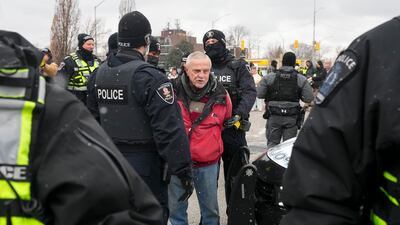After seven days of protests, police in Canada's Ontario province on Sunday began clearing demonstrators who were blocking a border crossing with the United States.
The Ambassador Bridge, which links Windsor and the US city of Detroit in Michigan, is the busiest border crossing in North America and carries 25 per cent of trade between the two countries.
Its closure has had serious economic repercussions on both sides of the border, hitting the car industry especially hard.
“Today, our national economic crisis at the Ambassador Bridge came to an end,” Windsor Mayor Drew Dilkens said after the protest site was cleared.
Despite removing the blockade, the bridge still remains closed to traffic. Mr Dilkens said the crossing would reopen when it was “safe”.
White House Homeland Security Adviser Liz Sherwood-Randall said that she and other US officials including Homeland Security Secretary Alejandro Mayorkas and Transport Secretary Pete Buttigieg had been in contact with their Canadian counterparts to end the disruption at the border.
"Canadian authorities intend to reopen the Ambassador Bridge today after completing necessary safety checks," Ms Sherwood-Randall said in a statement on Sunday.
The Windsor police force said it made several arrests at the protest site on Sunday.
"The arrested persons are all facing a charge of mischief. Multiple vehicles within the demonstration area were also seized," a police statement said.
“Enforcement will continue in the demonstration area and there will be zero tolerance for illegal activity. The public should avoid the area,” it said.
The protest in Windsor is part of wider Canadian movement against coronavirus restrictions and vaccine mandates.
Demonstrations were held in cities across Canada, with the largest taking place in the nation’s capital, Ottawa.
For more than two weeks, hundreds of lorries and their drivers have occupied the city, in what politicians referred to as a “siege”.
On Saturday, thousands of Canadians arrived in the capital to support the lorry drivers.
“We want our freedom back. Forget the mandates, forget the vaccines, let's move on now,” said one protester, who wished to be identified only by his first name, Josh.
He said he was double vaccinated but felt the government mandates had gone too far.
“It’s a great event to be at,” said Asuf Khokhar, a police officer in Hamilton, Ontario, who said he was suspended for refusing to reveal his vaccination status.
“These mandates are ridiculous,” he told The National. “We all have to make our own personal choices.”
Many in the crowd said they were not leaving until all restrictions across the country were lifted.
Police in Ottawa have been criticised for failing to prevent the lorry drivers from occupying the city and not doing enough in the weeks since to remove them.
The city’s police chief Peter Sloly said he needed 1,800 more officers to be able to properly control the situation.
Security and law enforcement experts said it will be much more difficult for police to remove the protesters in Ottawa than it was in Windsor.
Police in Windsor began slowly moving in on protesters on Saturday after an Ontario Superior Court judge issued an injunction against the protesters on Friday and gave them a 7pm deadline to leave the bridge. Protesters ignored the injunction, setting up a tense day-long stand off with police.
Mr Dilkens said the protesters were holding the Canadian economy hostage.
“You effectively have 200 people who are holding hostage the national economic interests of Canada but also having a big impact on US trade and US families as well,” he told The National on Saturday.
He said Windsor had never experienced a protest so far reaching in its effect.
The mayor had been calling for provincial and federal support for several days before it arrived in the form of officers from the Ontario Provincial Police and the Royal Canadian Mounted Police.






























